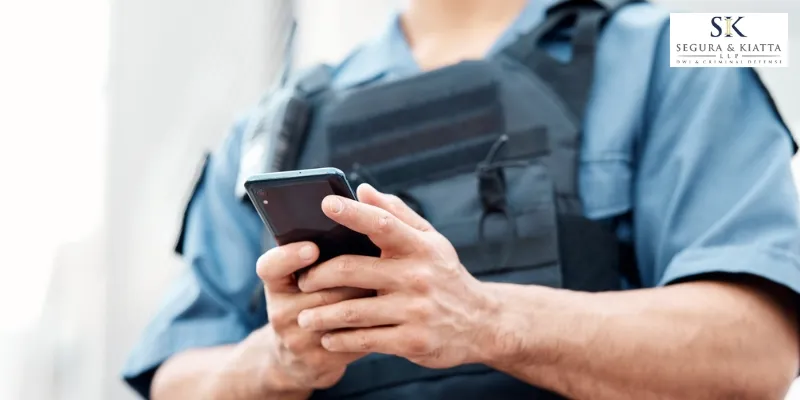
- Available 24/7
- 281.570.6400
- call us today!
Can the Police Search Your Phone in Texas? Know Your Rights!

Why This Question Matters?
It’s no surprise that one of the most common questions I get is: When can the police search your phone? Your phone holds your entire life—your texts, emails, photos, search history, and social media. It is important to know your rights so you can protect the valuable information stored on your device.
Your Phone Is Protected Under the Law
In Texas, your phone is treated just like your home or private papers. That means the police need a search warrant signed by a judge to legally go through it. Unless there’s an emergency, which is known as exigent circumstances, they cannot access your phone without a warrant, even if you’ve been arrested.
No warrant means no legal search. That’s your constitutional right, and courts take it seriously.
Don’t Be Pressured into Giving Consent
Police officers often use subtle pressure to get people to hand over their phones voluntarily. When police search your phone, they might say things like:
- “It’s easier if you just give us permission.”
- “Go ahead and unlock it for us.”
- “We’re going to get a search warrant anyway.”
These statements are designed to make you feel like you have no choice, but you do. You are never required to unlock your phone or share your passcode. Unless the police have a valid warrant or a legal exception applies, they cannot search your device.
If the police conduct an illegal search, your defense attorney may be able to get that evidence thrown out in court and even have your charges dismissed.
The Two Exceptions to the Warrant Rule
There are only two main exceptions to the warrant requirement for when police search your phone:
- Voluntary Consent
If you freely and voluntarily allow the police to search your phone—without pressure or threats—that counts as consent. But if the officer says something like, “Give us consent or you’re going to jail,” that’s coercion, not voluntary consent.
- Exigent Circumstances
This is a rare exception that applies only in true emergencies, such as when someone’s life is in danger or evidence is about to be destroyed. Even then, the police must still have probable cause to justify acting without a warrant.
What to Say if the Police Ask for Your Phone?
If an officer asks to search your phone, stay calm and respectful. You can say:
“I do not consent to any search of my phone.”
Do not resist or physically stop them from taking your phone, but make it clear that you do not agree to the search. Refusing consent is not resisting arrest; it’s asserting your rights.
Important Tip: Protect Your Passcode
If your phone uses facial recognition or fingerprint ID, consider switching to a numerical passcode. While the police cannot legally compel you to give up your passcode, they can physically hold your phone up to your face or press your finger to unlock it. Using a passcode provides stronger legal protection for your privacy.
If Police Search Your Phone, Contact Us
Knowing your rights is the first step in protecting them. This isn’t about being anti-police; it’s about ensuring that your privacy and freedom are respected under the law.
If you have the police search your phone or they are trying to use digital evidence against you, call Segura & Kiatta right away. We can review your case, challenge any illegal search, and fight to protect your rights and your future.
Contact us
Contact segura & kiatta criminal defense
Schedule Your
Free Consultation
*Required Information
Our Location
Segura & Kiatta, Criminal Defense
345 Commerce Green Blvd
Suite 200
Sugar Land, Texas 77478


